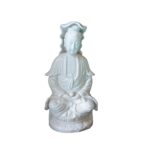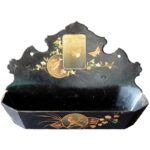Bodhisattva Guanyin figurine
A figurine made of white porcelain blanc de chine, most probably made in China, where this type of porcelain is called dehua 德化 – after the district in Fujian province where it is made. Dehua porcelain is covered with a transparent glaze that covers the porcelain base very precisely, which gives this porcelain a special appearance. Dehua and its Japanese variant hakuji are usually undecorated, the products are completely unpainted. The statuette depicts (Bodhisattva) Guanyin 觀音, one of the most important figures in the Buddhist pantheon, and one of the most revered Bodhisattvas in Chinese and Japanese Buddhism. Bodhisattva Guanyin is the Chinese version of the bodhisattva figure Avalokiteśvara, whose veneration began to spread through the Mahayana Lotus Sutra. In China, the formerly male figure of Avalokiteśvara took on a female form, and Guanyin began to be worshipped as the bodhisattva of mercy and compassion. Guanyin ... more
A figurine made of white porcelain blanc de chine, most probably made in China, where this type of porcelain is called dehua 德化 – after the district in Fujian province where it is made. Dehua porcelain is covered with a transparent glaze that covers the porcelain base very precisely, which gives this porcelain a special appearance. Dehua and its Japanese variant hakuji are usually undecorated, the products are completely unpainted. The statuette depicts (Bodhisattva) Guanyin 觀音, one of the most important figures in the Buddhist pantheon, and one of the most revered Bodhisattvas in Chinese and Japanese Buddhism. Bodhisattva Guanyin is the Chinese version of the bodhisattva figure Avalokiteśvara, whose veneration began to spread through the Mahayana Lotus Sutra. In China, the formerly male figure of Avalokiteśvara took on a female form, and Guanyin began to be worshipped as the bodhisattva of mercy and compassion. Guanyin is particularly understood as the protector of women and children. (HM)





































Do you have a comment or additional information about the subject?